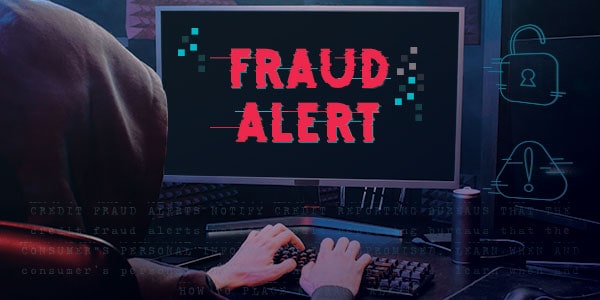A credit fraud alert is a notification placed on your credit report informing credit card issuers and credit reporting bureaus that you may have been the victim of fraud or identity theft.
When should you place a fraud alert on your credit report?
You can set a fraud alert on your credit report any time you suspect fraud. You should place a fraud alert on your credit report at the first evidence of identity theft or fraud. For example, if you find an unauthorized new line of credit created in your name, place a fraud alert as soon as possible.
You will get a free copy of your credit report from each of the three credit agencies if you place a fraud alert on your credit report.
How do you place a fraud alert on your credit report? How long does the process take?
You need to send a credit fraud alert to any one of the three credit bureaus-Equifax, Experian, and TransUnion-to inform them that your identity may have been stolen.
It only takes a few minutes online to place a fraud alert on your credit report with any of the three major credit bureaus. You can also place a fraud alert by mail or over the phone. Requesting a fraud alert is simple and free.
- Experian fraud alert number: 1-888-397-3742; Experian, P.O. Box 9554, Allen, TX 75013.
- TransUnion fraud alert number: 1-800-680-7289; TransUnion Fraud Victim Assistance Department, P.O. Box 2000, Chester, PA 19016.
- Equifax fraud alert number: 1-888-766-0008; Equifax Consumer Fraud Division, P.O. Box 740256, Atlanta, GA 30374.
What will happen after you place a fraud alert on your credit report?
It will be more difficult for someone to register a new credit account in your name once a fraud alert is in place.
Before extending new credit in your name, the company must verify your identification.
What should people know about credit freezes and fraud alerts before they get one?
Credit freezes and fraud alerts can help protect you from identity theft and prevent your personal information from being misused after it has been stolen. However, they are not the same.
A fraud alert asks creditors to verify your identity before extending new credit.
A credit freeze prevents access to your credit reports until you lift them. A credit freeze gives a person control over and restriction on their credit record. Thieves, scammers, and other unauthorized parties will have a more challenging time opening credit in that consumer’s name without their permission.
What is the difference between a credit freeze and a fraud alert? When would a person need one versus the other?
A credit freeze provides more security. Fraud alerts expire automatically after a specific time, whereas credit freezes stay until you lift them.
Consumers who don’t want to freeze and unfreeze their credit while applying for credit can consider a fraud alert.
The fraud alert will be active for 90 days. You can renew it, but you’ll have to remember to do so, or it will expire on its own.
A credit freeze lasts until you lift it temporarily or permanently in almost all jurisdictions. It only lasts seven years in a few states.
Most consumers prefer the credit freeze option since it offers the best protection.
Unlike a fraud alert, it will not expire, so you won’t have to remember to renew it.
If you intend to apply for credit, you will need to unfreeze your credit.
A fraud alert is a fantastic option if you don’t want to bother with freezing and unfreezing your credit every time you apply.
Do you need to manually end a credit freeze, or does it automatically expire?
You need to end a credit freeze manually. It will not expire automatically.
You must contact each of the three credit agencies (Equifax, Experian, and TransUnion) individually to remove a credit freeze from your credit reports.
You can request to lift the credit freeze by phone, mail, or online.
Depending on how you’re doing it, you may need the PIN to temporarily lift or altogether remove the credit freeze in the future.
What is an extended fraud alert?
You will find three types of fraud alerts:
- An initial fraud alert
- An extended fraud alert
- Military fraud alert
An extended fraud alert is valid for seven years. You’ll need a police report or an identity theft report from the Federal Trade Commission to set an extended fraud warning on your credit report.
You can get a free copy of your credit report from each of the three credit agencies twice a year. You can also review your credit report six times a year.
The credit bureaus will remove you from their marketing lists for unsolicited credit and insurance offers for the next five years. If you want to be included, they will add you.
When might you know it’s time to end your credit freeze or fraud alert?
You may decide that the credit freeze and fraud alert are no longer necessary at some point.
You could also wish to lift the credit freeze temporarily so you can apply for a mortgage, credit card, or other loans.
You can lift a fraud alert in the same way you placed it by calling one of the credit bureaus.
Most fraud alerts are set to expire within a year. I will recommend you extend the fraud alert since it doesn’t affect your credit score.
Removing a fraud alert can make it easier for someone to apply for credit in your name without your awareness, increasing your risk of identity theft.
Conclusion
It's a myth that setting up a credit fraud alert might harm your credit. A fraud alert doesn't affect your credit score. It informs creditors that you may have been a victim of identity theft and urges them to take extra steps to verify your identity.









